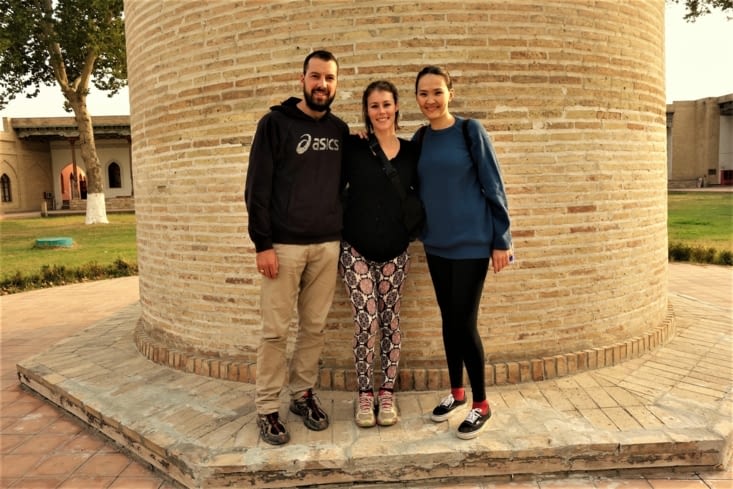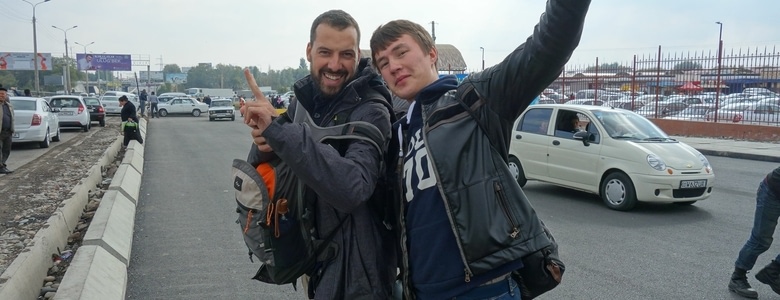
Français
Le 14 Octobre, nous traversons la frontière entre le Kazakhstan et l'Ouzbékistan. Dans le marshrutka pour venir, nous avons rencontré Otarek, un jeune Ouzbek qui est coiffeur à Shymkent (Kazakhstan) et qui revient à Tashkent tous les week-ends chez sa famille. Il ne parle pas anglais, alors nous utilisons Google Translate pour communiquer. Il peut parler ouzbek et kazakh (qui ont des ressemblances), mais il ne parle pas russe. Ainsi contrairement au Kazakhstan, les jeunes générations en Ouzbékistan (qui faisait aussi parti de l'URSS) n'apprennent pas automatiquement le russe.
English
On 14th October, we cross the Kazakh-Uzbek border. In the marshrutka to come, we have met Otarek, an Uzbek guy who works in Shymkent, Kazakhstan as hairdresser and come back to Tashkent every weekends to visit his family. He cannot speak English at all so we use Google Translate to communicate. He can speak Uzbek and Kazakh language (which are quite similar), but he cannot speak Russian, which shows that at the contrary of Kazakhstan, younger generations do not learn automatically Russian (although it was also part of the USSR).
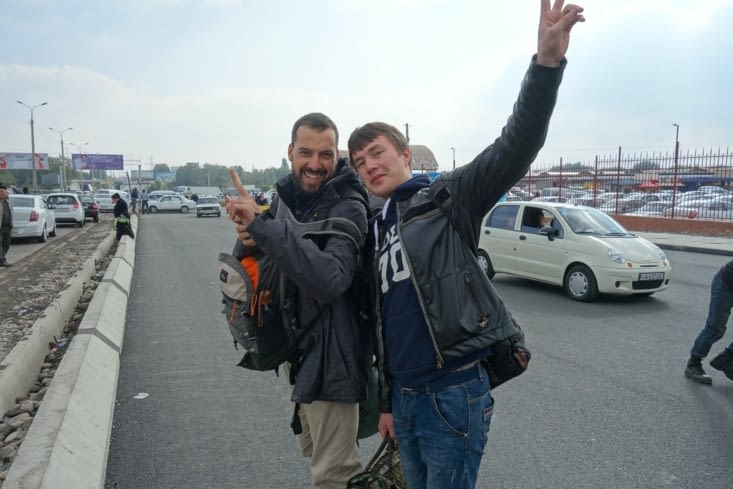
Français
Le passage de la frontière s'annonce catastrophique. Nous sommes confinés dans un petit corridor et devons attendre un long moment. Les gens commencent à en avoir marre et à se plaindre auprès des militaires. Ils se mettent à pousser et les officiels ont du mal à calmer la foule. Les femmes peuvent passer en priorité, Flavie passe donc devant pour faire la queue un peu plus loin dans une salle complètement pleine, mais réussit finalement à avoir le tampon d'entrée sur son passeport. Elle doit attendre un long moment que Julien la rejoigne à son niveau dans la queue. Finalement, nous avons tous les deux notre tampon et entrons dans un autre couloir, où les gens sont compressés les uns contre les autres.
Les gens ont avec eux des écrans TV plasma, des sacs de 50 kg de nourriture et des énormes valises. Certains portent même leurs sacs sur leurs têtes car il n'y a pas de place au sol pour mettre ses affaires. Après une longue attente, nous entrons finalement dans la salle de contrôle des bagages. Nous devons d'abord remplir une fiche d'informations pour déclarer l'argent que nous avons (en chiffres et en lettres pour chaque monnaie). Nous avons quelques pièces restantes de chacun des pays que nous avons visités jusque là et il n'y a pas assez de place sur la feuille pour tout écrire ! Haha !
L'officier est comme un robot, le pauvre. Il doit vérifier les bagages de tout le monde avec un scanner. Il en peut tellement plus qu'il ne regarde même pas les personnes qui lui disent bonjour. Nous entrons enfin dans l'espace d'après pour le contrôle des personnes, les femmes d'abord bien sûr. Après ce long processus, nous sommes autorisés à entrer en Ouzbékistan. Ce fut le plus long et le plus fatiguant passage de frontières que nous ayons fait jusque là. Il n'y avait pas plus d'étapes que d'habitude, mais il y avait tellement de monde et aucune organisation, aucune queue délimitée... Bref un gros n'importe quoi, où chacun poussait le plus possible. Le genre de passage de frontières où l'on a l'impression que les hommes sont traités plus comme des bêtes que comme des êtres humains.
English
The border crossing is going to be a catastrophe. We are crowded in a small corridor and wait for long time. People get bored and start shouting against the military officers. People are pushing and the officer struggle to calm down the crowd. The officers ask ladies to enter first into the office already crowded with people. So Flavie is going first and she gets the stamp on her passport, but then she waits so long time that Julien is finally at the same level than her in the queue. Finally, we both have got our stamps!
We enter in another room more crowded than the first. People are bringing plasma screen TV, 50 kilos bags of food and huge luggages. Some people even carry their luggages on their head because there is no space on the floor to put their belongings! After a long waiting time we are in the luggage control area. First we need to fill a form to declare how much money we have (both written in letters and numbers for each currency). We have few coins left from each country we visited so far and there is not enough space to write down everything on the form! Haha!
The officer is like a robot, poor guy. He has to check every luggage with the X-ray machine. He is so bored that he never looks at the people saying hello to him. We finally enter in another room for the body security check; ladies first as usual. The officer talks to Flavie in Uzbek and looks angry because she doesn't understand. After this long process, we are finally free to enter in Uzbekistan. It was the longest and the most tiring border crossing we have done so far! It's not that there were more steps than usual, but there were so many people and no organization, no defined queue... Kind of a mess where everybody try to go first, pushing as they can. Then you have the feeling that people are treated more like animals than like human beings.
Français
Maintenant que nous sommes en Ouzbékistan, nous devons nous procurer de la monnaie locale. Nous avons retiré des dollars au Kazakhstan et nous cherchons à les échanger pour un bon taux. Ici tout le monde change son argent au marché noir, car le taux officiel est largement sur évalué, rendant la vie extrêmement chère. Comme nous allons nous en rendre compte, même les hôtels utilisent le taux officieux ! C'est assez stressant pour nous, car nous n'avons jamais fait ça. Mais tout le monde nous a dit de le faire et plusieurs amis l'ont fait fait avant nous sans problème. Après négociations avec un homme, nous changeons 100 dollars contre 640 000 sums, soit un gros paquet de 128 billets de 5000 sum (la plus grosse coupure qui existe). Nous nous croyons riches, alors que ce n'est que 100 dollars ! Haha !
Otarek est toujours avec nous. Il nous aide à trouver un taxi pour aller à notre hôtel (apparemment il n'y a pas de bus). Une fois arrivés à l'hôtel, nous ressortons tout de suite pour aller à la gare acheter nos billets de train pour le lendemain. En effet, nous avons prévu de nous joindre à Auken, notre amie kazakhe, pour un week-end dans l'est de l'Ouzbékistan. Sur le chemin du retour, nous achetons des samas (sorte de beignets en forme de triangle fourrés à la viande et aux légumes).
Dans la cuisine de l'hôtel, nous discutons avec un Canadien, tout en prenant notre repas. Ensuite, nous sommes bien contents d'aller au lit, car la journée fut longue.
English
Now we are in Uzbekistan and we need local money. We have withdrawn dollars in Kazakhstan and we want to exchange them for a good rate. In Uzbekistan everybody change money on the black market, because the official rate is too over evaluated, which makes the living cost really high. As we are going to see, even hotels use the unofficial rate ! It is quite stressful for us because we are not used to. But everybody have told us to do like this and many friends of us did it before without any problems! After negotiations with a guy, we finally exchange 100 dollars against 640,000 sum, or a bunch of 128 banknotes of 5,000 sum (the biggest existing banknote) ! We feel rich even if we have only 100 dollars in our hands! Haha !
Otarek is still with us. He helps us to find a taxi to go to our hotel (there is no bus to easily go where we want). As soon as we arrive at the youth hostel, we need to go back outside to go to the train station and buy our tickets for tomorrow. Indeed, we plan to join Auken, our Kazakh friend for a week-end trip in the Eastern part of Uzbekistan! On the way back to the hotel, we buy samas (riangle shape donut stuffed with vegetables and meat) for diner.
In the hotel's kitchen, we meet a Canadian with who we share traveling stories while eating our samas. The day was long and we are happy to go to bed!
Français
Aujourd'hui nous nous levons tôt (6h15) pour prendre le train jusqu'à Marguilan. Nous avons convenu avec Auken de nous retrouver à la gare à 7h15. Nous train part à 8h, mais il est obligatoire d'arriver au moins 30 minutes en avance. Nous nous dépêchons et arrivons à 7h15 devant l'horloge de la gare. Nous attendons jusqu'à 7h45, mais nous ne voyons pas notre amie arriver et nous n'avons pas de numéro de téléphone pour l'appeler. Finalement nous décidons de nous renseigner sur le numéro de notre quai. Lorsque nous demandons à l'agent, il nous répond : « Désolé Madame, vous devez au moins attendre 7h pour monter sur le quai » ! A ce moment, nous réalisons que comme des idiots nous avons oublié de changer notre montre d'heure. Ici en Ouzbékistan, il est une heure plus tôt qu'au Kazakhstan. En vrai, nous nous sommes levés à 5h15 et nous étions à la gare à 6h15. Nous nous sentons bien bêtes, mais aussi soulagés de n'avoir pas manqué le train. Mais nous devons donc attendre une heure avant le départ du train. Auken arrive comme prévu à 7h15 et nous prenons le train tous ensemble pour Marguilan.
English
Today we wake up early (6:15 am) to take the train to Marguilan. We have planed to meet Auken at the train station at 7:15am. The train leaves at 8:00 am but it is compulsory to be in the train station at least 30 minutes before. We hurry up and here we are : 7:15 am in front of the big train station clock! We wait until 7:45 am but Auken is still not here and we have no phone to call her. We finally decide to ask the platform number of our train. When we ask the officer, he answers “Sorry Madam you need to wait at least until 7:00 am to go on the platform” ! At this moment we realize that, like idiots, we totally forgot to change the time of our watch. Here in Uzbekistan it is actually 1 hour earlier than in Kazakhstan! In reality we woke up at 5:15 am and reached the train station at 6:15 am. We feel so stupid., but relieved that we didn't miss the train. Thus we need to wait 1 hour before catching the train. Auken finally arrives on time at (the true) 7:15 am and we take the train all together to Marguilan. =)
Français
Le trajet en train est sympa, premièrement parce que cela fait un moment que nous n'avons pas vu Auken et que nous avons beaucoup de choses à nous raconter, deuxièmement parce que le paysage est vraiment joli. Comme vous pouvez le voir sur la photo, le sol est marron-orangé et il y a des montagnes un peu partout. Le temps est ensoleillé, c'est une bonne journée pour visiter. A un moment, le train passe dans un tunnel et il arrive alors quelque chose de bizarre. Tout le monde doit fermer les rideaux et rester assis jusqu'à la fin du tunnel. Il est interdit de prendre des photos, d'ouvrir les rideaux ou de se lever. L'équipage est très attentif et surveille les mouvements de tout le monde. Finalement nous ne saurons jamais ce qu'il y a dans ce tunnel, mais c'est probablement des installations militaires...
English
The journey on train is nice, first because we haven't seen Auken for a while and we have a lot of things to talk and secondly because the landscape is really beautiful. As you can see on the picture the ground is brown-orange and there are mountains at the back. The weather is good, a good day for sightseeing! During our journey the train goes into a tunnel and it happens something strange. Everybody need to close the curtains and keep siting until the end of the tunnel. It is totally forbidden to take pictures, open the curtains or stand up. The staff is very serious and controls everybody movements! Eventually we will never know what is hidden in this tunnel but it's probably some military installations...
Français
Nous arrivons à Marguilan, pile à l'heure pour le déjeuner. L'hôtel est vraiment incroyable : il y a une énorme porte sculptée à l'entrée. La décoration intérieure est splendide : il y a des tapis ouzbek accrochés aux murs ainsi que des chapeaux traditionnels. Dans le jardin, on peut manger sous les arbres à kaki (qui sont presque mûrs) et de petits palmiers. De quoi se sentir détendus !
English
We are now in Marguilan, just in time to have lunch. The hotel is just amazing! The door is huge and finely carved. The decoration inside is splendid: there are big carpets hung (accroché, pendu) on the wall and Uzbek hats hung on the wall. In the garden there are persimmon trees (almost ready to be eaten) and small palm trees. We feel very relax here!
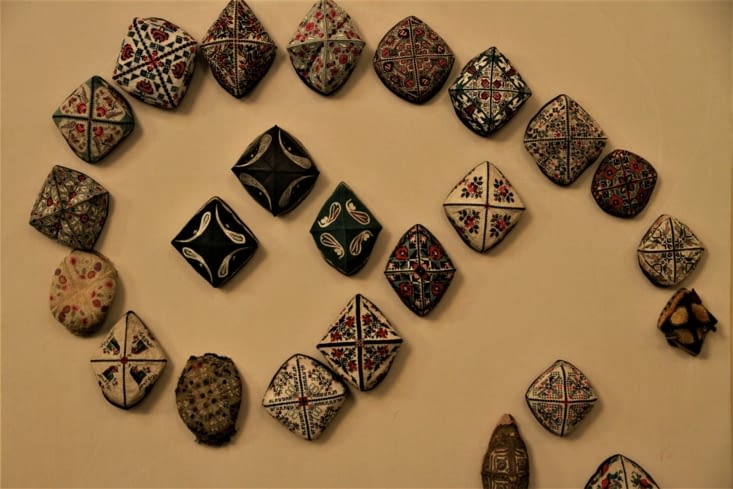
Français
C'est l'heure du déjeuner et l'hôtel a déjà préparé le repars.
Il y a du pain traditionnel (selon Auken, la partie centrale est la
meilleure, Flavie se dépêche donc d'en prendre un bout), de la
soupe, deux salades, des manties... Bien assez pour être rassasié !
English
It is lunch time and the hotel has already prepared Uzbek food for us. There are the traditional bread (Auken says the center is the best part so Flavie hurry to take a piece of the center), soup, 2 different salads, manties... More than enough !
Français
L'après-midi, nous avons prévu d'aller voir des artisans qui fabriquent des tissus (soie et coton). L'endroit est carré avec une cour intérieure, dans le style ouzbek. Les gens vivent dans la cour et ne peuvent pas être vu depuis la route. C'est très calme.
English
This afternoon we plan to see a handicraft master who makes fabrics (silk and/or cotton). The place is square shape. Auken explains that is Uzbek style. People live in the courtyard ans cannot be seen from the road. The atmosphere is very quiet.

Français
Les artisans utilisent des colorants naturels qu'ils font eux-mêmes pour décorer les tissus. Les pigments doivent être dilués dans différents liquides pour obtenir la couleur désirée. Ensuite un tampon est utilisé (à droite sur la photo) pour imprimer le motif sur le tissu.
English
The craftsmen use natural colors to decorate fabrics. These pigments need to be diluted in different liquids to obtain the desired color. Then a stamp (at the right side of the picture) is used to print the pattern on fabrics.
Français
Sur la première photo, un homme colore des fils tendus ensemble.C'est une tâche méticuleuse et il faut être patient. Ensuite les fils sont apportés dans la salle de tissage. Sur les photos suivantes, vous pouvez voir comment les fils sont tissés. Une dame utilise un métier à tisser pendant qu'une autre prépare les fils. Cela semble physique, car elle doit utiliser ses bras et ses jambes en même temps. Chaque pièce peut prendre plusieurs semaines pour être finie.
English
The first picture shows a man coloring yarns taut together. It is a meticulous job, you need to be patient. Then, these yarns go to the weaving room. On the following pictures you can see the process to weave them. A lady is using a weaving loom while another is installing the yarns to make another fabric. This job looks physical, she has to use her legs and arms in the same time. A piece of fabric can take several weeks to be finished.
Français
Finalement nous allons au magasin où tout est exposé. Il y a des écharpes, des chapeaux, des habits et de quoi décorer des murs. Certains tissus sont teints et d'autres brodés ; on ne sait plus où donner de la tête tellement il y a de couleurs et de motifs différents (comme des grenades, qui sont communes en Ouzbékistan), chaque pièce est unique. Auken et Flavie essayent des vestes et des chapeaux, qui sont très élégants, mais malheureusement trop chers pour notre budget (200 euros).
English
Finally we go to the shop where all the fabrics are shown. There are scarves, pillow cases, hats, clothes and wall decorations. Some fabrics are painted with natural colors and others are embroidered. There are different colors and patterns everywhere (like pomegranate which is famous in Uzbekistan), we don't know where we should look, each piece is unique. Auken and Flavie try jackets and hats, which is elegant but unfortunately too expensive for our budget (200 euros).
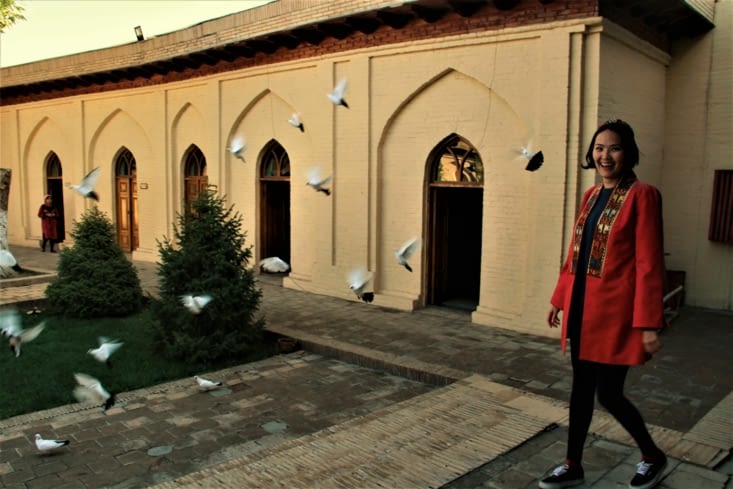
Français
Le chapeau carré sur cette photo est le chapeau traditionnel ouzbek. Pensez-vous que cela va bien à Julien ? =)
English
The square shaped hat on this picture is the traditional hat in Uzbekistan. Do you thing it fits well with Julien ? =)
Français
Nous allons ensuite voir un autre artisan, où nous retrouvons les
mêmes articles, bien que chaque artisan a ses propres motifs et
couleurs. Puis nous faisons un tour dans un mausolée, avant de
rentrer à l'hôtel. Pour dîner, nous faisons un pique-nique dans
notre chambre, pour finir nos réserves, au cours duquel nous
partageons nos histoires de voyage jusque tard dans la soirée.
English
Then we go to see another crafts master, where we can see similar objects, even if each one has his own colors and patterns. Then we quickly have a look of a mausoleum, before going back to our hotel. We finish the day with a picnic in the hotel room to finish our food provisions. Three of us share travel funny stories until late in the evening.
Français
Le lendemain nous nous réveillons tôt (mais moins tôt que hier quand même^^), pour aller à Richton et Kokand pour visiter d'autres ateliers d'artisans. Sur le chemin, nous pouvons voir des champs des cotons (la région est une grande productrice de coton et c'est le moment de la récolte). Nous pouvons aussi voir de la vigne sur le bord de la route. Les gens utilisent aussi la vigne pour faire de l'ombre devant chez eux. C'est la saison du raisin et Flavie est contente de pouvoir acheter tous les jours du raisin vraiment bon.
English
Today we wake early to go to Richton and Kokand to visit other masters' workshops. On the way we can see cotton fields (this area is a big producer of cotton and now it is harvest time). We also can see vine at the edge of the road. People use vine to make shadow in front of their place. It is also grape season and Flavie is really happy to buy really tasty grape every day!
Français
Comme vous pouvez le voir, notre chauffeur porte un chapeau traditionnel ouzbek. Comme nous, vous vous demandez peut-être comment cela tient ?
English
As you can see our driver wears the traditional Uzbek hat. Like us, maybe you are wondering how it stays on the man head?
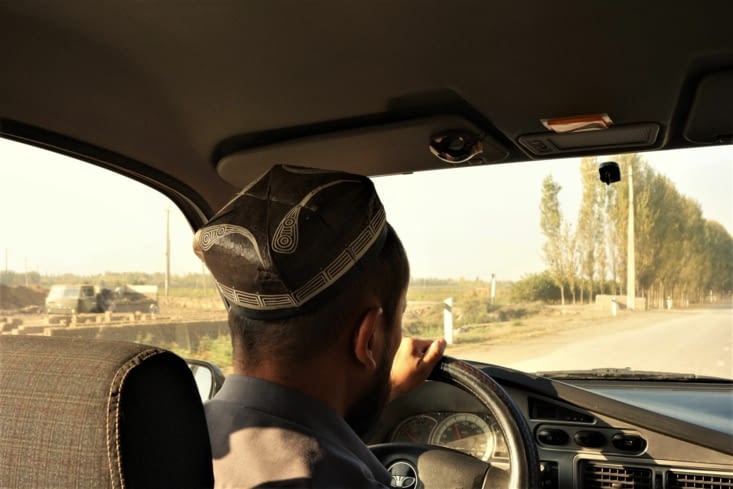
Français
Après 30 minutes, nous arrivons à l'atelier de l'un des maîtres-artisans à Richton. La porte et la décoration extérieure nous donnent envie de voir ce qu'il y a à l'intérieur. La forme de goutte d'eau est en fait une noix de badiane (ou anis étoilé). Cela ressemble à une amande, mais c'est un peu plus épicé.
English
After a while (30 minutes) we finally arrive at one master place in Richton. The door and the decoration outside make us excited to see what there are inside! The water drop shape you can see on the picture is actually a star anis fruit's shape. It looks like an almond but it is a little bit spicy.
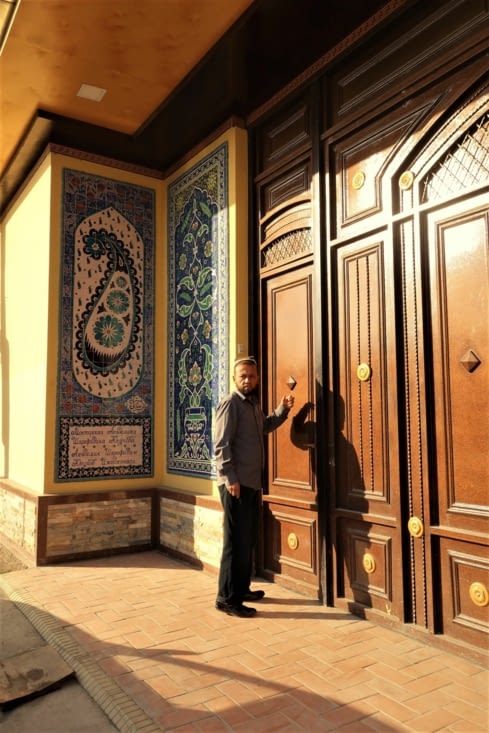
Français
Cet artisan est spécialisé dans la poterie (comme beaucoup à Richton). Dès que l'on entre dans la cour, nous ne savons plus où poser le regard tellement il y a de beaux objets sur la table et accrochés aux murs. Ils sont tous faits à la main et peints avec des couleurs naturelles bleues et turquoises. Après un moment passé à comparer les différents pots et assiettes, Auken décide d'acheter un gros pot, comme celui à droite sur la photo.
English
This master is specialized in pottery (as a lot of them in Richton). As soon as you enter in the courtyard you don't know where to look upon because there are hundreds of beautiful objects on the wall and on the table. They are all handmade with natural turquoise and blue colors. After a while comparing the different plates and pots, Auken decides to buy a big pot like the one on the right side of the picture.
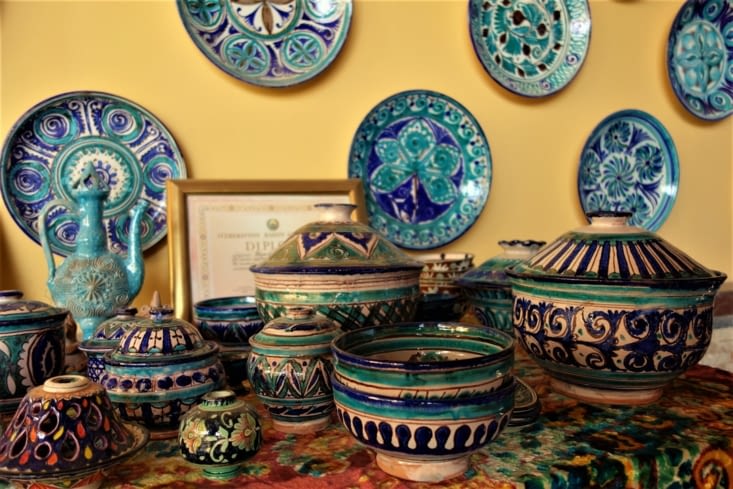
Français
Il y a un autre artisan très connu pas très loin de là où nous sommes et nous décidons d'y aller à pied, ce qui est une bonne opportunité pour voir les habitants dans leurs vies de tous les jours. Richton est une petite ville, mais il y a du monde au bazar ce dimanche.
English
There is another master not to far from where we are. We decide to go there by foot which is a good opportunity to see the inhabitants in their life in the streets. Richton is a small city but the bazaar place is very crowded on this Sunday.
Français
Après 30 minutes de marche, nous arrivons devant une autre très jolie porte gravée et décorée de mosaïque. Ici aussi il y a partout des assiettes et des pots. Il est possible de visiter l'atelier, où un potier nous fait une démonstration, en 5 min il a fait une assiette creuse à partir de la terre. Ensuite, celle-ci sera séchée, peinte et cuite dans un grand four. Nous pouvons voir comment ils utilisent un instrument particulier pour disposer les poteries dans le four afin de gagner de l'espace et d'éviter qu'elles se touchent les unes les autres. Finalement nous passons dans une autre pièce où un homme est en train de peindre une assiette très délicatement. Il nous explique qu'il a commencé quand il était adolescent et qu'il aime ce métier. Cela peut prendre jusqu'à une semaine pour finir une assiette comme celle-là. Cette fois Auken achète une grande assiette. Maintenant tu es équipée pour cuisiner un Plov pour 10 personnes, non ?
English
After 30 minutes walking we arrive in front of another very beautiful door with detailed engravings and mosaics. Here there are also plates and pots everywhere! It is possible to visit the workshop. The potter shows us how to make a deep plate. In 5 minutes it is done! Then, it should be dried, painted and put in a big oven. We can see they use a special tool to arrange the potteries in the oven, to make more space and avoid them to touch each other. Finally we visit the painting room where a man is painting a plate very carefully. He explains us that he starts this job when he was a teenager and he really likes it. It takes almost a week to finish a plate like this one. This time Auken buys a big plate. So now your are equipped to prepare a Plov for 10 people, aren't you ? ;-)
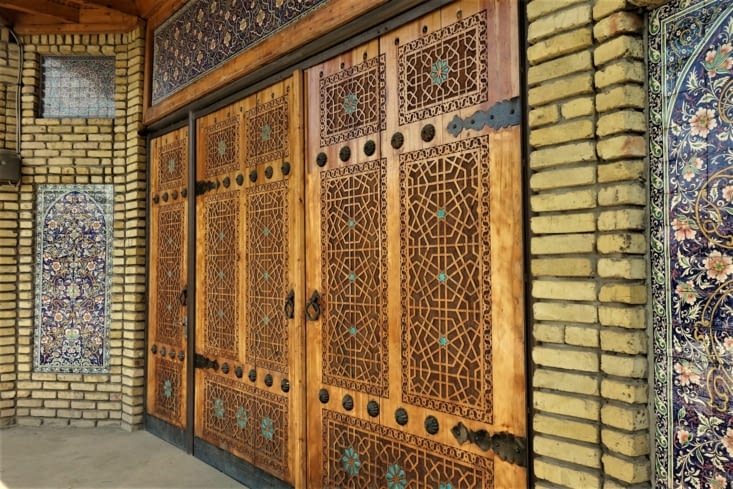
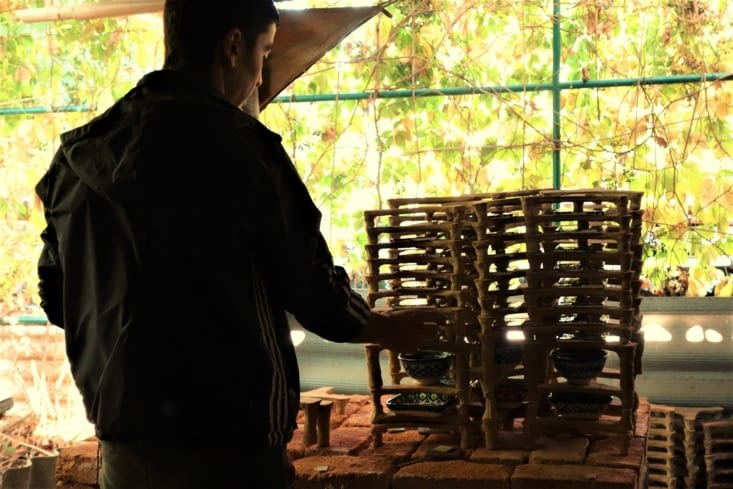
Français
Une autre visite nous attend pour finir la matinée. L'artisan est un fabricant de tapis kirghizes, il fait lui même son fil à partir de la laine de mouton. Sa fille qui apprend l'anglais nous explique comment faire des fils de laine plus fins et comment ils produisent les tapis et tissus. Ils ont aussi une yourte dans leur jardin, qui nous rappelle notre nuit dans le camp nomade en Chine. Sa plus petite fille porte des habits très colorés. Avant de partir, l'artisan nous offre le thé avec des douceurs (amandes, noix, abricots...). Nous apprécions la pause pendant qu'il joue d'un instrument traditionnel qui consiste à faire vibrer avec sa bouche une corde métallique. Nous remercions cet homme très gentil avant de prendre congé.
English
Another visit comes to complete our morning. The craftsman is a Kyrgyz carpet maker. He produces his own wool from sheep hair. His daughter who is learning English explains us how to make thiner the wool yarns, how they produce carpets and fabrics. They also have a yurt in their garden which reminds us our night in the nomad camp in China. His smallest daughter is cute, she is wearing very colorful clothes. Before leaving, the craftsman offers us tea and sweets (almonds, walnuts, apricots, …). We enjoy food while listening him playing a traditional instrument, which consist in vibrating a metal string with his mouth. Then we thank this very nice and generous guy before leaving.
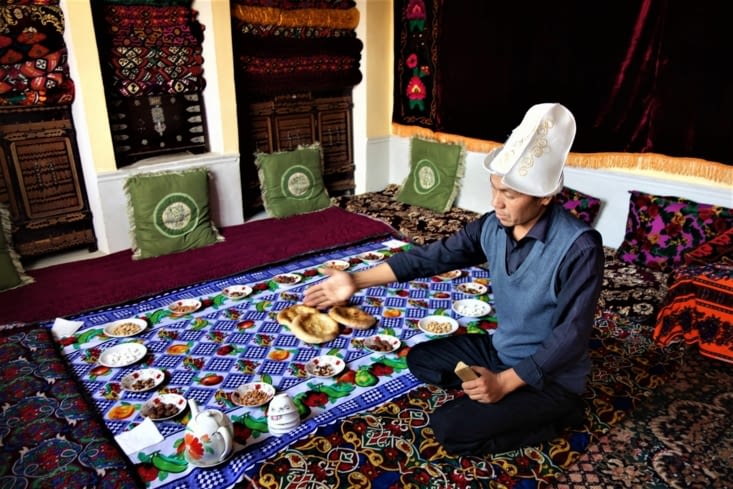
Français
Avant d'aller à Kokant, nous faisons une pause pour le déjeuner. Nous mangeons du Plov, une spécialité faite de riz, viande, oignons, carottes et épices. C'est en fait un lat ouzbek, mais nous en avons déjà mangé dans les autres pays d'Asie Centrale. Le truc marrant est que les Ouzbek mangent du Plov seulement à midi (et presque jamais pour le dîner). C'est très bon mais les quantités sont trop grosses ! Nous ne pouvons pas finir !
English
Before going to Kokant we have a break for lunch. We decide to eat Plov which is a specialty made from rice, meat, onion, carrot and spices. In fact, it's an Uzbek dish, but we have already eaten it in the other Central Asian countries. The funny thing is that Uzbek people eat Plov only for lunch (and almost never for dinner). The food is very good but the quantity is too big! We can't finish!
Français
Après une petite heure de trajet et quelques marshrutkas, nous arrivons en début d'après-midi à Kokand, où nous allons visiter le palais du Khan. Il fut construit par Muhammad Khudayar Khan de 1863 à 1874 et comportait 113 pièces à l'origine, seulement 19 ont survécu jusqu'à nos jours. C'est très coloré et finement décoré.
English
After less than an hour and few marshrutkas, we arrive at the beginning of the afternoon in Kokand, where we are going to visit the Khan's Palace. It was built by Muhammad Khudayar Khan between 1863 and 1874 and was composed of 119 rooms originally. Unfortunately only 19 of them are remaining. It's very colorful and finely decorated.
Français
Notre guide nous emmène ensuite dans une ancienne mosquée et madrassa (école coranique), la Jami Mosquée, qui fut construite de 1805 à 1816. Au centre de la cour, il y a un minaret de plus de vingt mètres, d'où le muezzin appelait les fidèles à la prière.
Il y a un magasin d'halva dans l'enceinte de la mosquée, où nous pouvons goûter cette spécialité. Ce n'est pas le même qu'au Kazakhstan et au Kirghizstan, on dirait plus du nougat mou.
English
Then our guide brings us to see a former mosque and madrassa (Muslim school), the Jami Mosque, which was built between 1805 and 1816. In the center of the courtyard, there is a minaret from which the muezzin called the faithful to pray.
In the mosque premises, there is an halva shop, where we can taste this local sweet. It's not the same than in Kazakhstan or Kyrgyzstan, it's more similar than soft nougat (French sweet).
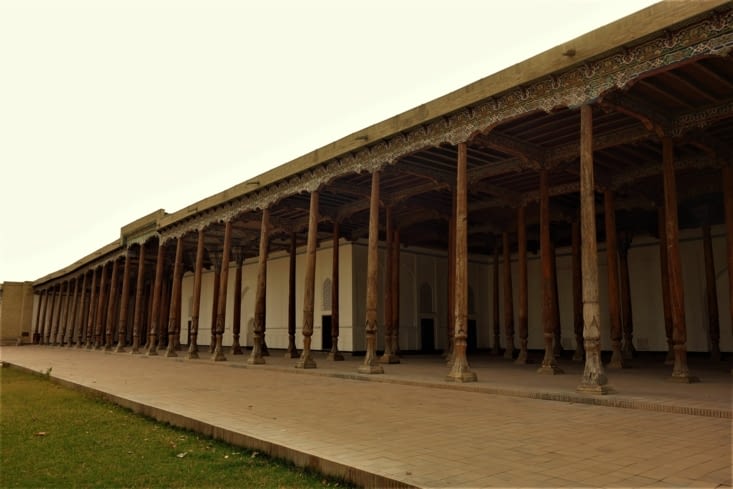
Français
Nous allons ensuite à la gare, où nous prenons le train, qui nous dépose 5h plus tard à Tashkent. Il faut mentionner qu'il y a en Ouzbékistan des trains très modernes et confortables (mais tous ne sont pas comme celui-ci, comme nous le découvrirons plus tard). Ensuite nous retournons à l'hôtel près de la gare où nous étions vendredi soir. Ce WE fut vraiment riche en découverte de la culture et de l'histoire ouzbeks. Sans Auken, nous n'aurions jamais rencontré tous ses artisans et put faire autant de choses en deux jours. Merci mille fois !
English
Then we go to the train station, where we take the train, which brings us to Tashkent, after 5 hours. We need to mention that there are in Uzbekistan very modern and comfortable trains (but all are not like this one, as we will discover later). Once in Tahskent, we go back to the hotel where we were last Friday night, near the train station. Without Auken, we would have never met all these craftsmen and done so many things in 2 days. Thanks a million!
